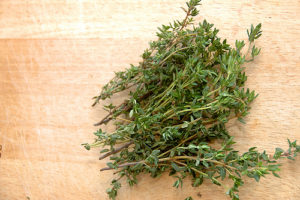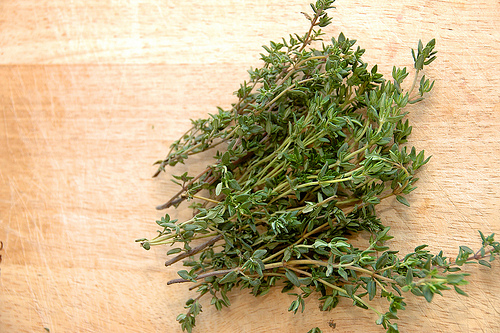Short Answer:
Yes, Thyme is Paleo!
You Are Right About Thyme!
Thyme is a delicate looking, fragrant herb from the mint family known for the warm essence it adds to dishes like casseroles, soups, stews, sautéed vegetables and meats. It has small, curled, elliptical leaves, with greyish green and white color. There are over 400 subspecies of thyme and some of its varieties are Archer’s Gold and Rainbow Falls.
This herb is very versatile and has culinary and medicinal purposes. The distinct taste of thyme makes it a culinary staple. The medicinal properties of thyme include the ability to lower blood pressure levels and treatment for acne. During the ancient times, it has been used as an embalming agent to preserve deceased pharaohs in Egypt. Thyme is also used in household to keep moths from linens and as soap, cosmetics, antibacterial cream and perfume.
Thyme is native to Asia, southern Europe and Mediterranean regions and is cultivated in many areas in the world including the America. Fresh and dried thyme are both available all year round.
Nutritional Profile of Thyme
Although thyme is used in small amounts, regular incorporation has proven to increase nutrients absorbed by the body. Thyme is packed with vitamin A, B, C and K. It contains beta carotene, folic acid and minerals iron, manganese, fiber, copper, calcium, phosphorus, potassium and zinc.
Thyme is also rich in antioxidants rosmarinic, ursolic acids and terpenoids, and volatile oils such as carvacolo, bornbeol, geraniol and thymol which have antibacterial, antimicrobial and antiseptic abilities.
5 Health Benefits of Thyme
Thyme has many health benefits, thanks to the high antioxidant levels and nutrients present in it. Here are some of the benefits that thyme has to offer:
1. Powerhouse of antioxidants
The high levels of antioxidants in thyme have shown to have anticancer properties. They fight free radicals, slowing down the aging process and protecting from the damage it can cause.
Thyme also contains a variety of flavonoids, including apigenin, naringenin, luteolin, and thymonin. These flavonoids increase the antioxidant capacity of thyme.
2. Antiseptic and Antibacterial Properties
The volatile oils present in thyme have antibacterial, antiseptic, and antimicrobial abilities that could fight against different bacteria and fungi including staphylococcus aureus and E.coli. These are carvacolo, borneol and thymol.
3. High Levels of vitamin C
Thyme is rich in Vitamin-C, which is a natural antioxidant that helps the body develop resistance against infectious agents and scavenge harmful, pro-inflammatory free radicals.
4. Lower blood pressure
Thyme has the ability to lower blood pressure and cholesterol levels in the body. This is because of the high amounts of potassium and fiber it contains.
5. Respiratory health
Thyme has been used as an expectorant, treating respiratory tract problems such as cough, chest congestion and bronchitis. It prevents the mucus from forming in the lungs, throat and intestines.
What Experts Say About Thyme
“Thyme, however, is worth using, awful jokes aside. I mean, what else but thyme could stave off the oxidative damage done to corn oil under deep-frying conditions for a couple extra hours?” – Mark Sisson
All you ever wanted to know about Thyme and Paleo
Mark’s Daily Apple. 6 Common Herbs and Why You Should Eat Them (Hint: They Don’t Just Taste Good)
http://www.marksdailyapple.com/health-benefits-herbs/#axzz3PUnrEVoP
Robb Wolf.
http://robbwolf.com/2010/11/29/the-paleo-table-8-herbs-spices-you-should-get-to-know/
Paleo Porn. Is Thyme Paleo?
http://paleoporn.net/q/is-thyme-paleo/
Food Facts. Mercola. It’s Definitely Thyme.
http://foodfacts.mercola.com/thyme.html
The World’s Healthiest Foods. Thyme
http://www.whfoods.com/genpage.php?tname=foodspice&dbid=77
Nutrition and You. Thyme Herb Nutrition Facts.
http://www.nutrition-and-you.com/thyme-herb.html
Health Line. 9 Health Benefits of Thyme
http://www.healthline.com/health/health-benefits-of-thyme
Did we miss anything?
Comment below and let us know what you think. Do you agree with our conclusion?
photo credit: Farmanac Thyme

